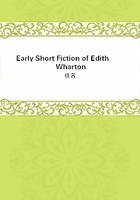
第38章
"I see," he remarked with a smile, "that you know the hour at which our saint should be visited."
Wyant agreed that the hour was indeed felicitous.
The stranger stood beamingly before the picture.
"What grace! What poetry!" he murmured, apostrophizing the St. Catherine, but letting his glance slip rapidly about the chapel as he spoke.
Wyant, detecting the manoeuvre, murmured a brief assent.
"But it is cold here--mortally cold; you do not find it so?" The intruder put on his hat. "It is permitted at this hour--when the church is empty. And you, my dear sir--do you not feel the dampness? You are an artist, are you not? And to artists it is permitted to cover the head when they are engaged in the study of the paintings."
He darted suddenly toward the steps and bent over Wyant's hat.
"Permit me--cover yourself!" he said a moment later, holding out the hat with an ingratiating gesture.
A light flashed on Wyant.
"Perhaps," he said, looking straight at the young man, "you will tell me your name. My own is Wyant."
The stranger, surprised, but not disconcerted, drew forth a coroneted card, which he offered with a low bow. On the card was engraved:--Il Conte Ottaviano Celsi.
"I am much obliged to you," said Wyant; "and I may as well tell you that the letter which you apparently expected to find in the lining of my hat is not there, but in my pocket."
He drew it out and handed it to its owner, who had grown very pale.
"And now," Wyant continued, "you will perhaps be good enough to tell me what all this means."
There was no mistaking the effect produced on Count Ottaviano by this request. His lips moved, but he achieved only an ineffectual smile.
"I suppose you know," Wyant went on, his anger rising at the sight of the other's discomfiture, "that you have taken an unwarrantable liberty. I don't yet understand what part I have been made to play, but it's evident that you have made use of me to serve some purpose of your own, and I propose to know the reason why."
Count Ottaviano advanced with an imploring gesture.
"Sir," he pleaded, "you permit me to speak?"
"I expect you to," cried Wyant. "But not here," he added, hearing the clank of the verger's keys. "It is growing dark, and we shall be turned out in a few minutes."
He walked across the church, and Count Ottaviano followed him out into the deserted square.
"Now," said Wyant, pausing on the steps.
The Count, who had regained some measure of self-possession, began to speak in a high key, with an accompaniment of conciliatory gesture.
"My dear sir--my dear Mr. Wyant--you find me in an abominable position--that, as a man of honor, I immediately confess. I have taken advantage of you--yes! I have counted on your amiability, your chivalry--too far, perhaps? I confess it! But what could I do? It was to oblige a lady"--he laid a hand on his heart--"a lady whom I would die to serve!" He went on with increasing volubility, his deliberate English swept away by a torrent of Italian, through which Wyant, with some difficulty, struggled to a comprehension of the case.
Count Ottaviano, according to his own statement, had come to Siena some months previously, on business connected with his mother's property; the paternal estate being near Orvieto, of which ancient city his father was syndic. Soon after his arrival in Siena the young Count had met the incomparable daughter of Doctor Lombard, and falling deeply in love with her, had prevailed on his parents to ask her hand in marriage. Doctor Lombard had not opposed his suit, but when the question of settlements arose it became known that Miss Lombard, who was possessed of a small property in her own right, had a short time before invested the whole amount in the purchase of the Bergamo Leonardo. Thereupon Count Ottaviano's parents had politely suggested that she should sell the picture and thus recover her independence; and this proposal being met by a curt refusal from Doctor Lombard, they had withdrawn their consent to their son's marriage. The young lady's attitude had hitherto been one of passive submission; she was horribly afraid of her father, and would never venture openly to oppose him; but she had made known to Ottaviano her intention of not giving him up, of waiting patiently till events should take a more favorable turn. She seemed hardly aware, the Count said with a sigh, that the means of escape lay in her own hands; that she was of age, and had a right to sell the picture, and to marry without asking her father's consent. Meanwhile her suitor spared no pains to keep himself before her, to remind her that he, too, was waiting and would never give her up.
Doctor Lombard, who suspected the young man of trying to persuade Sybilla to sell the picture, had forbidden the lovers to meet or to correspond; they were thus driven to clandestine communication, and had several times, the Count ingenuously avowed, made use of the doctor's visitors as a means of exchanging letters.
"And you told the visitors to ring twice?" Wyant interposed.